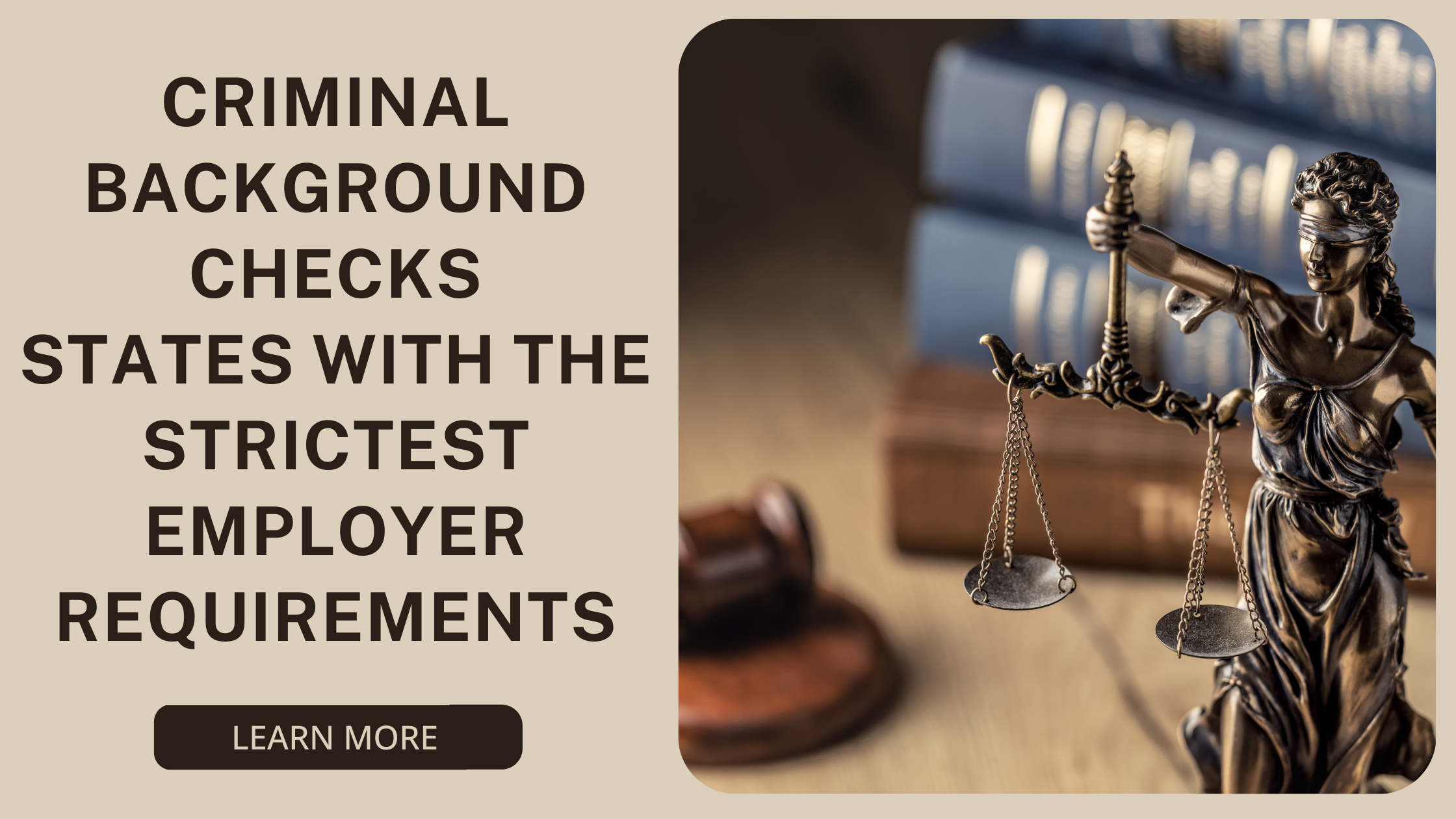Criminal Background Check Services: States with the Most Stringent Requirements for Employers
Criminal background checks are a fundamental component of the hiring process, allowing employers to assess the criminal history of potential employees. They help mitigate risks associated with workplace safety, protect company reputation, and ensure a safer environment for both employees and customers. Employers in many industries rely on criminal background checks to make informed hiring decisions and maintain compliance with state and federal laws.
Criminal background checks typically include information about an individual’s criminal history, such as convictions for misdemeanors, felonies, and arrests. They may also provide details on incarceration history and sex offender registry status. The specific data provided by a criminal background check can vary depending on the type of check conducted.
Types of Criminal Background Checks
- Statewide Criminal Checks: These checks provide access to state databases and report criminal activity within the state where the check is conducted. It typically includes information from state courts, arrest records, and convictions.
- National Criminal Checks: A broader check that covers multiple states by accessing nationwide databases. While it provides a more comprehensive overview, the accuracy may vary depending on the completeness of each state’s record system.
- FBI Background Checks: These checks access the FBI’s National Crime Information Center (NCIC) database, offering the most thorough and accurate information, but they require fingerprints and take longer to process.
- County and City Checks: These checks are conducted at the local level and are more precise, offering detailed records from a specific county or city. They are particularly useful for finding criminal history information that may not be available in statewide databases.
Why Criminal Background Checks Matter for Employers
Criminal background checks are crucial for employers in protecting their business, workforce, and customers. They play a critical role in risk management by identifying candidates who may pose potential threats. Employers rely on these checks to make data-driven decisions, ensuring they hire individuals who align with the company’s standards and values.
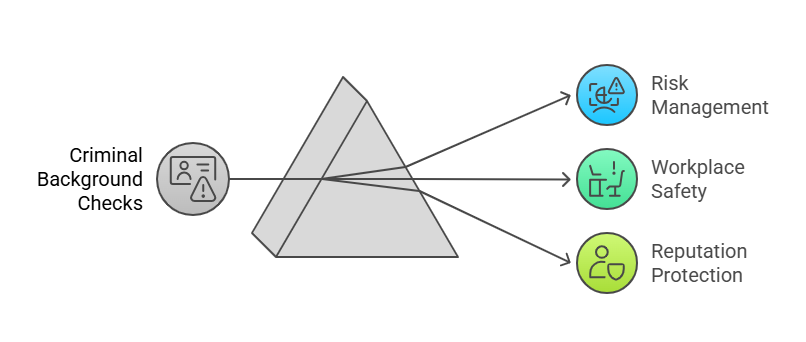
Here are the key reasons criminal background checks are important for employers:
- Risk Management: By uncovering a candidate’s criminal history, employers can avoid hiring individuals who may pose a risk to the company or its employees.
- Workplace Safety: Employers want to create a safe environment for their employees, and criminal background checks help identify those who may have a history of violent or unethical behavior.
- Reputation Protection: An employer’s reputation is essential for attracting talent and customers. Hiring individuals with criminal backgrounds that could affect the company’s image may result in negative publicity.
Criminal background checks not only protect employers, but they also ensure that hiring practices comply with both state and federal regulations. However, the level of regulation and restrictions varies greatly between states.
Overview of Stringent State Requirements
While federal guidelines provide a basic framework for background checks, each state has its own laws governing how criminal background checks should be conducted and the extent to which they can impact hiring decisions. Some states have more stringent requirements, which can include limitations on the use of criminal history in hiring decisions, waiting periods for criminal record disclosure, and additional restrictions on what can be considered in the hiring process.
Key Factors Influencing State Requirements:
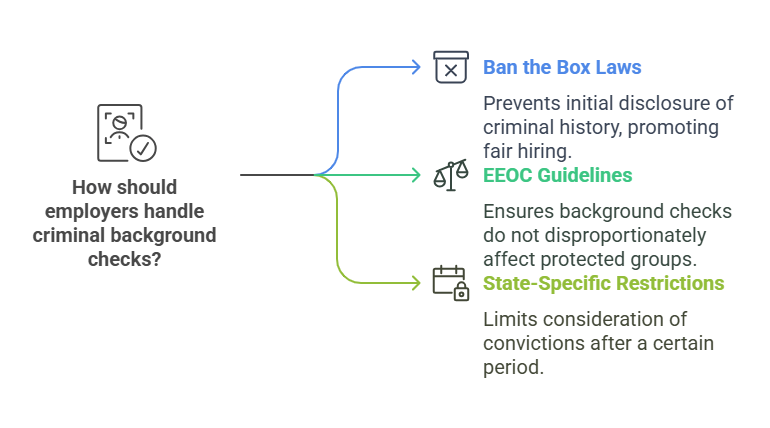
- Ban the Box Laws: Many states have enacted “ban the box” laws, which prevent employers from asking about a candidate’s criminal history on initial job applications. These laws aim to give candidates with criminal records a fairer chance in the hiring process.
- EEOC Guidelines: The Equal Employment Opportunity Commission (EEOC) provides guidelines on how to assess criminal background information. Employers must ensure their background check policies do not disproportionately affect candidates based on race or other protected categories.
- State-Specific Restrictions: Some states prohibit employers from considering criminal convictions after a certain period, such as a waiting period of 7 or 10 years. Additionally, some states have laws that restrict the use of arrest records if no conviction was made.
Data Table: Stringent States for Criminal Background Checks
| State | Extent of Criminal History Disclosure | Waiting Period for Disclosure | Restrictions on Using Criminal Records in Hiring |
|---|---|---|---|
| California | Full disclosure of convictions and arrests | 7 years for most crimes | Employers can’t ask about arrests not leading to conviction |
| New York | Criminal records from state and city | 7 years for most offenses | Criminal convictions older than 7 years can’t be considered for hiring |
| Texas | Convictions, arrests, and probation history | No waiting period | Employers can’t use arrest records that didn’t result in conviction |
| Florida | Full criminal history | 7 years for misdemeanors | Employers must assess the nature of the crime and its relevance to the job |
| Illinois | Statewide criminal record checks | 5 years for non-violent crimes | Must assess the nature of the crime in relation to job duties |
This table highlights some of the most stringent states for criminal background checks. These states have imposed limitations on what criminal information can be considered during the hiring process and the timeframes within which certain records can be used.
Understanding the specific criminal background check requirements in different states is essential for employers to avoid legal pitfalls and ensure compliance. States with more stringent laws require employers to adapt their hiring practices and policies, particularly regarding the use of criminal history. Employers must stay up-to-date with these regulations to ensure they are hiring fairly and legally.
RapidHireSolutions vs. Other Background Check Providers
When it comes to criminal background checks, employers must ensure they are using a service that not only provides accurate results but also complies with the specific legal requirements of each state. RapidHireSolutions stands out in the industry for its ability to deliver accurate, fast, and compliant criminal background checks, adhering to both federal and state-specific regulations.
Other providers may offer background checks, but they often struggle with compliance and turnaround times. Here’s a detailed comparison of RapidHireSolutions against some of its competitors, based on five key factors that employers need to consider.
Pros & Cons Table
| Factor | RapidHireSolutions (✅) | Competitors (❌) |
|---|---|---|
| Compliance with State Regulations | Fully compliant with state-specific laws, including Ban the Box and EEOC guidelines. | Some competitors may not stay up to date with changing state laws. |
| Turnaround Time | Results delivered within 24 hours, allowing faster hiring decisions. | Competitors may take 15–20 days or longer to provide results. |
| Cost-Effectiveness | Offers competitive pricing without compromising on quality or compliance. | Competitors may have higher pricing for slower or less accurate results. |
| Accuracy | AI-powered background checks ensure high accuracy with minimal human error. | Some competitors rely more on manual processing, leading to potential errors. |
| Ease of Use | User-friendly platform with straightforward access to reports and support. | Some services may have clunky or complicated interfaces. |
Overview of RapidHireSolutions Services
RapidHireSolutions is committed to making the background check process as seamless and efficient as possible for employers. By utilizing AI-driven tools and automating many aspects of the verification process, RapidHireSolutions ensures that employers not only get accurate criminal background checks but also that the process is completed swiftly and in compliance with each state’s unique regulations.
The platform is designed to be easy to use for HR professionals, offering simple access to results, support, and compliance documentation. With the help of machine learning, it can identify relevant patterns in criminal records, providing a clearer picture of potential risks posed by candidates.
One key advantage of RapidHireSolutions is its ability to navigate the complexities of different state laws regarding criminal background checks. From “Ban the Box” regulations to waiting periods for certain offenses, the platform ensures that the background checks performed are fully compliant with the latest legal standards.
Turnaround Time Comparison Table
| Provider | Average Turnaround Time | Time to Deliver Results |
|---|---|---|
| RapidHireSolutions | ✅ 24 hours | ✅ Fast, accurate, and compliant |
| Competitor A | ❌ 15-20 days | ❌ Slower processing |
| Competitor B | ❌ 10-15 days | ❌ Less efficient with compliance |
| Competitor C | ❌ 10-25 days | ❌ Delays common |
RapidHireSolutions leads the pack in terms of turnaround time, delivering criminal background check results in just 24 hours. This is crucial for employers looking to fill positions quickly and ensure that the hiring process is not unnecessarily delayed due to lengthy background check procedures.
In contrast, competitors may take up to 20 days to process background checks, which can significantly slow down the hiring process. For employers looking to stay competitive in a fast-paced job market, the ability to obtain accurate background information quickly can make all the difference.
Analysis of State-Specific Compliance and AI-Driven Background Checks
One of the greatest advantages of using RapidHireSolutions is its ability to navigate state-specific regulations effectively. Every state has different laws regarding criminal background checks, and these laws can change frequently. RapidHireSolutions ensures that its background check services are always up to date with the latest legal requirements.
For example, Ban the Box laws, which prevent employers from asking about criminal history on initial job applications, vary from state to state. In states like California and New York, these laws are particularly stringent. RapidHireSolutions’ platform automatically adjusts the process to comply with such regulations, so employers can be confident they are not violating any laws.
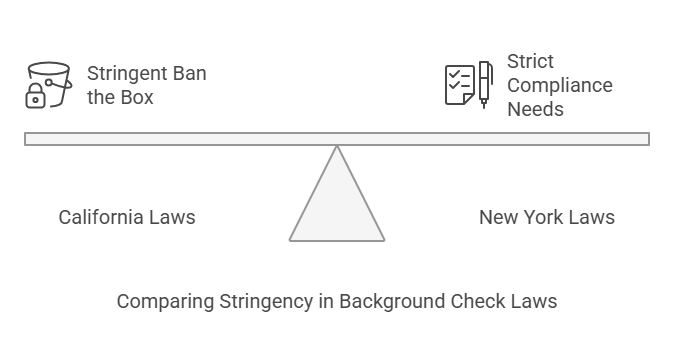
Furthermore, by using AI to conduct criminal background checks, RapidHireSolutions reduces the risk of human error and ensures the highest level of accuracy. The system analyzes large datasets, including criminal records from multiple jurisdictions, to provide a comprehensive and reliable background report. This is especially important when considering the variety of state laws and the nuances involved in each state’s criminal record disclosure requirements.
Pros & Cons Section
Pros for RapidHireSolutions (✅):
- Accurate and reliable results thanks to AI-driven algorithms that minimize errors.
- Fast processing times with background check results delivered within 24 hours.
- State-compliant services that adhere to complex and changing state laws, including Ban the Box and EEOC regulations.
- User-friendly interface that simplifies the background check process for HR professionals.
Cons for Competitors (❌):
- Slower turnaround times (15–20 days or more) which can delay the hiring process.
- Higher pricing for less efficient or non-compliant background check services.
- Inconsistent compliance with state-specific regulations, risking potential legal violations.
- Less accuracy in background checks due to manual processing or outdated systems.
Additional Insights
The Importance of Accuracy and Compliance
Employers must prioritize accuracy when conducting criminal background checks to avoid hiring individuals with criminal records that could pose a risk to the workplace. While accuracy is essential, compliance with state-specific regulations is just as critical. Failing to follow the legal guidelines can result in legal ramifications, such as lawsuits or fines.
By using a provider like RapidHireSolutions, employers can rest assured that their background check services are fully compliant with state laws. Additionally, AI-powered technology simplifies the process by automating routine checks, ensuring that data is processed more efficiently and with fewer chances for human error.
The Role of AI in Simplifying Background Checks
AI technology is revolutionizing the background check process. With RapidHireSolutions leveraging AI-driven tools, employers can quickly access reliable, accurate criminal background check results. This technological innovation is helping businesses meet compliance standards while keeping their hiring processes moving quickly, reducing the stress of navigating complex state-specific laws.
Legal Aspects of Criminal Background Checks
When it comes to criminal background checks, understanding the legal framework is essential for employers. Each state has its own set of rules and regulations governing how background checks should be conducted, the types of information that can be used in hiring decisions, and the rights of job candidates. In this section, we will explore the key legal requirements for criminal background checks, including important federal laws, state-specific regulations, and how employers can ensure compliance with these laws.
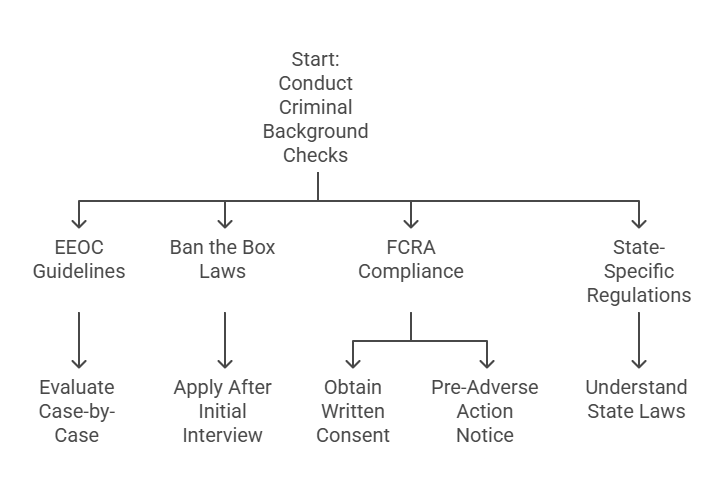
Key Legal Requirements for Criminal Background Checks
- EEOC Guidelines The Equal Employment Opportunity Commission (EEOC) enforces federal laws prohibiting discrimination in employment. While the EEOC does not prohibit criminal background checks, it does provide guidelines to ensure that the information is used fairly and consistently. The EEOC advises employers to evaluate criminal history on a case-by-case basis and assess the nature of the crime, the time passed since the conviction, and the relevance to the job being applied for. Employers must also avoid blanket policies that exclude applicants with criminal records unless there is a legitimate business need for such a policy.
- Ban the Box Laws The Ban the Box movement refers to laws that prevent employers from asking about a candidate’s criminal history on an initial job application. The idea behind these laws is to give applicants with criminal records a fair opportunity to be considered for a job before their background is examined. States like California, New York, and Massachusetts have strict Ban the Box laws that prohibit employers from asking about criminal history until later in the hiring process, typically after an initial interview or job offer is made.
- Fair Credit Reporting Act (FCRA) The Fair Credit Reporting Act (FCRA) governs the use of consumer reports, including background checks, in employment decisions. Under the FCRA, employers must obtain written consent from candidates before conducting a criminal background check. Additionally, if an employer decides not to hire a candidate based on the results of a background check, the employer must provide a pre-adverse action notice to the candidate, giving them a chance to dispute the information.
- State-Specific Regulations Every state has its own laws regulating the use of criminal background checks in hiring. For example, California and New York have laws restricting the use of certain criminal history information, such as expunged records or arrests that did not result in convictions. Some states have waiting periods that prohibit employers from considering criminal convictions that occurred beyond a specific number of years, while others have specific guidelines about which types of offenses are relevant for different job positions. Understanding these nuances is crucial for employers to remain compliant with state-specific laws.
FAQ Section: Common Questions About State-Specific Background Check Laws
What is the difference between statewide and national criminal background checks?
A statewide background check searches criminal records within a specific state, whereas a national background check searches criminal records across all 50 states. Employers may need to conduct both types of checks depending on the job and the states in which the candidate has lived or worked.
Can an employer ask about an applicant's criminal history during the interview?
It depends on the state. Some states have Ban the Box laws that prevent employers from asking about criminal history on initial job applications or during early stages of the interview process. However, employers can ask about criminal history later in the process, typically after the interview.
Can an employer reject a candidate based solely on their criminal history?
No, employers should evaluate criminal history in context. Under EEOC guidelines, employers must consider factors like the nature of the offense, its relevance to the job, and how much time has passed. Employers must also avoid blanket exclusions based on criminal history.
Do employers need to get consent before running a criminal background check?
Yes, under the Fair Credit Reporting Act (FCRA), employers must obtain written consent from candidates before conducting a background check. Failure to obtain consent can lead to legal issues for the employer.
How long can a criminal conviction be considered by an employer?
The length of time an employer can consider a criminal conviction depends on the state and the nature of the offense. Some states have waiting periods that limit how far back a criminal record can be considered, while others allow convictions to be considered indefinitely. It’s important for employers to be familiar with their state's laws.
Conclusion
Understanding the complex landscape of criminal background check services is crucial for employers. With varying state-specific requirements, Ban the Box laws, and guidelines set by the EEOC and FCRA, employers need a service that ensures compliance while also delivering fast, accurate results. RapidHireSolutions not only provides AI-driven, efficient background checks but also stays up to date with all federal and state regulations, ensuring your company remains compliant no matter where you are located.
By leveraging AI-powered background checks, employers can streamline the hiring process, reduce human error, and make more informed decisions while minimizing legal risks. Whether you are a small business or a large corporation, RapidHireSolutions ensures that your hiring process remains both efficient and legally compliant, ultimately helping you make the best hiring decisions for your organization.

